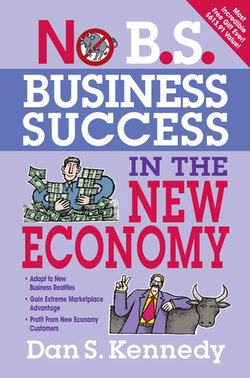Читать книгу No B.S. Business Success In The New Economy - Dan S Kennedy - Страница 12
На сайте Литреса книга снята с продажи.
A Matter of Personal Decision
ОглавлениеEntrepreneurial success, like most things in life, is mostly a matter of decision. A partnership, friendship, intimate relationship, or marriage that succeeds or fails, a book that gets written or remains a jumble of notes in a drawer, the garage that gets cleaned out Saturday or put off until next week—these are all the result of decision. Or, to be more accurate, decisions. Decisions, for example, of self-reliance and personal responsibility, or of not waiting for better or ideal timing or circumstances, help from others, or a muse’s delivery of just the right mood.
Dan Kennedy’s Eternal Truth #1
Every successful achievement begins
with decision. Most unsuccessful lives
are conspicuously absent
of decision.
Most people go through life making decisions by default, choosing only from narrow options dictated by others or by evolving circumstances. One millionaire friend of mine grew up in a very small town where, as he put it, there were two career options: working at the factory or raising pigs and chickens. With only a few exceptions, everybody he went to school and graduated with chose one of those two options. Stayed there, did one of those two things, died there. He left. Many people go through life as if confined by tall barbed wire fences and armed guards in whatever “place” they find themselves. Business owners do this too. They create and organize a business to be a certain thing and operate in a certain way, then act as if some law exists forbidding its change. In approaching their businesses this way, they might as well be stuck in that small town with a profound belief in only two options—the factory or the farm.
The New Economy mandates a much more willing and creative approach to constant change and evolution and reccurring reinvention in order to keep a business very specifically and currently relevant to the customers able and willing to support it. Agile businesses—run by mentally agile leaders—can prosper as never before. But domination purely by size or brand stature or longevity is entirely a thing of the past. The best recent object lesson: General Motors, a giant no longer relevant to its customers, run as if things like longevity or brand status mattered, as if size ensured continuation. Staying relevant requires constant change, and there is nothing less tolerated in The New Economy than the irrelevant. The economic power has returned to consumers and they know it. Consumers have been spoiled like indulgent billionaire parents’ prodigies with so many customized, specialized, niched choices that they now expect to get things that are clearly and uniquely for them. Satisfying them en masse is nearly impossible. But you are not locked into any business definition or model, any product mix, any pricing formula, any set of stay-inplace limitations, so if you decide to do so, you can be morphing to meet your customers’ greatest interests day to day.
I am often amused when traveling, and asked what I do, and I describe it as best I can, then I get the envious sigh, the gee-I-wish-I-could-do-that, and then the laundry list of complaints and dissatisfactions from the person about his present career or business or life. I’m amused because he apparently does not know he can change all that by decision. Similarly, when traveling and asked where I lived, and I answered “sunny Phoenix” (where I lived for over ten years), I’d often get the envious sigh, the gee-I-wish-I-lived-there-instead-of-in-X, then the litany of unpleasant things about their home city. This amuses me because apparently they haven’t noticed the highway signs in their town pointing the way out.
It’s amazing how people spend their lives in prisons entirely of their own making, the key dangling right there in the lock, no jailer in sight.
I find it very hard to work up much sympathy for most of these sad-sacks. I remember listening to a 40-or-so-year-old guy working behind the counter at a neighborhood convenience store where I sometimes stop for coffee complaining loudly, even poetically about his miserable job, low income, and lousy lot in life. I asked where he lived and which way he drove to work. After he answered, I asked if he’d noticed that everyday, twice a day he drove past the public library, a gigantic repository of help for changing your career, your finances, your life—all free. As you might guess, I might as well have been speaking Martian. If pressed, I assure you, he’d tell you he was too busy or too tired to read, or didn’t like to read, or had bad eyesight when he was in school, or some other pitiful excuse. Pfui.
